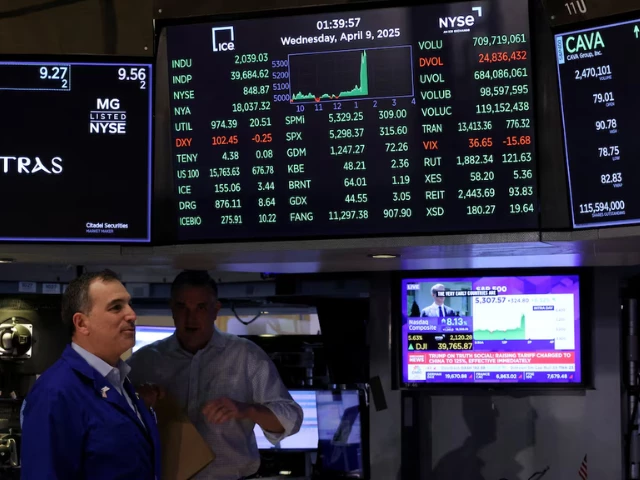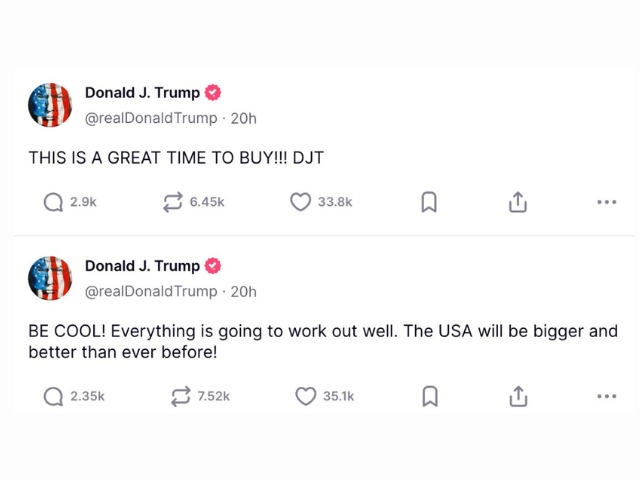US and global markets rebound after Trump announces 90-day tariff pause
90-day tariff suspension boosts market sentiment, but ministers warn of ongoing risks.

US stocks soared on Wednesday following President Donald Trump’s announcement of a 90-day pause on some reciprocal tariffs, a move that sent markets into a historic rally.
The news of the tariff shift came just as Wall Street was anxiously awaiting any sign of change in the president’s trade policy, which had previously sent markets into turmoil.
Trump’s announcement, which authorised a temporary halt to most of the tariffs, with the exception of those against China, spurred an immediate surge in US markets.
The Dow Jones Industrial Average skyrocketed by 2,963 points, or 7.87%. The S&P 500 jumped by 9.52%, while the tech-heavy Nasdaq soared by 12.16%.
The rally marked one of the most significant single-day rebounds in recent memory. The S&P 500 posted its best day since October 2008, and the Nasdaq had its best day since January 2001. The Dow experienced its best performance in five years.
Widespread market gains
The rally was widespread, with nearly every company in the S&P 500 seeing gains. Amazon saw a notable increase of 11.98%, while Nike rose by 11.36%. Airline stocks led the charge, with United Airlines soaring 26.14%, followed by Delta Air Lines up 23.38% and American Airlines, which surged 22.6%.
On the Nasdaq, tech giants also enjoyed significant gains, with Apple climbing 15.33%, Nvidia rising 18.72%, Palantir gaining 19%, and Tesla seeing an impressive 22.69% surge.
The S&P 500, which had recently been on the brink of entering bear market territory, is now up 12.86% from its recent low, although it remains 3.7% down from its peak on April 2, just before the announcement of the tariff changes. The Nasdaq remains 2.7% down from that date.
A volatile path to clarity
Trump’s move marked a shift in the volatile trajectory of US trade policy. For weeks, investors had been on edge as the president escalated the trade war with China, imposing heavy tariffs on Chinese goods. However, his new announcement provided much-needed clarity for Wall Street, and investors jumped at the chance to buy up stocks at discounted prices.
"The markets right now are extremely good," Trump said in a social media post following the announcement. "BE COOL! This is a great time to buy!!!"

Yet, uncertainty lingers as the US-China trade conflict remains unresolved. China is still subject to a 125% tariff on its goods, up from 104%, and other tariffs remain in place, including the 10% universal duties on all US imports.
Global markets respond
International markets initially reacted negatively to the escalation of tariffs. Japan’s Nikkei index closed 4% down, while South Korea’s Kospi index entered bear market territory, falling 20% from its peak. However, oil prices recovered after Trump’s announcement, with US oil gaining 4.65% to $62.35 a barrel, after earlier tumbling.
UK stock markets also made strong gains on Thursday following President Donald Trump’s announcement of a 90-day suspension of tariffs on most countries, excluding China. The FTSE 100 index rose more than 6% as global markets responded positively to the news of the tariff delay, marking a significant rebound in investor confidence.
However, the pause still leaves a 10% tariff in place for countries affected by the tariffs, including the UK, which had already been subject to the universal 10% rate. Meanwhile, imports of steel, aluminium, and cars to the US remain subject to a 25% tariff.
The UK’s response to Trump’s tariff policy has been cautious. With the tariff suspension not completely removing taxes on American imports, ministers have stressed the importance of careful negotiation moving forward.
Cooper emphasised that the UK would continue to advocate for reduced trade barriers and would seek beneficial trade agreements. “We want to see a reduction of trade barriers and we want to negotiate good arrangements that are in the UK’s interests,” she said.
Despite the positive market movement, UK ministers remain focused on future negotiations. Chancellor Rachel Reeves plans to visit Washington at the end of April for discussions with the US at the International Monetary Fund’s spring meeting.
Trump’s impact on the bond market
Trump also acknowledged the role of the bond market in his decision to pause tariffs. “I was watching the bond market. The bond market is very tricky,” he said. Despite some signs of instability, he touted the market's recovery, adding, "the bond market right now is beautiful."
Investors in US Treasury bonds had sold off significant amounts in recent days, concerned about the implications of the ongoing trade conflict. Deutsche Bank analysts noted that this may signal weakening demand for US-backed assets, which could affect the country’s ability to manage its large budget deficit.






















COMMENTS
Comments are moderated and generally will be posted if they are on-topic and not abusive.
For more information, please see our Comments FAQ